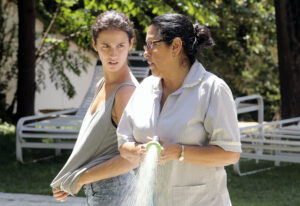Arts & Entertainment
UM Modern Languages Dept. Presents 4th Annual Hispanic Heritage Film Series
The Department of Modern Languages at the University of Mississippi recently announced the fourth annual Hispanic Heritage Series of films this fall semester as part of the celebrations honoring the Hispanic Heritage Month, Sept. 15 – Oct. 15. All five films have English subtitles. The films are free and open to the public on the following Thursdays at 6 p.m. in Lamar Hall, room 127.
“Thanks to the dedication of our Spanish faculty, the Oxford and UM community will have another golden opportunity to explore and learn about Hispanic cultures,” said modern languages chair Dan O’Sullivan. “Events like these showcase the dedication to cultural diversity from our department, the university, and the surrounding community.”
This year the series has several hard-to-see and well-made films from unexpected countries, the organizers said.
“Watching foreign movies not only gives us an opportunity to peek into far-away realities and to listen to foreign languages; it also exposes us to a wider range of film styles,” said Irene Kaufmann, one of the series organizers.
The series consists of five contemporary films from Spanish and Portuguese-speaking countries. See below for synopses of the films to be shown:
The season starts earlier than usual this year—Sept. 13—with “Sealed Cargo,” a Bolivian black comedy on the normally unfunny topic of the dumping of toxic waste in rural areas. It features magnificent photography of the Andean region with haunting images of indigenous culture appearing at crucial moments.
The second film, “Panama Canal Stories”—Sept. 27—is comprised of a series of short films that follow chronologically sequential stories. The connections are finely attuned so that they appear to tell a single story on the integration and lack of integration of the Panamanian and U.S. populations in the Canal Zone.

“The Second Mother”
The third film, “The Second Mother”—Oct. 4th—is the first Brazilian film in the series. IMDB.com describes the film as, “When the estranged daughter of a hard-working live-in housekeeper suddenly appears, the unspoken class barriers that exist within the home are thrown into disarray.” “The Second Mother” contains this social criticism but also is a heart-warming tale of a mother and daughter getting to know each other after a long separation.

“Summer 1993”
“Summer 1993” is the fourth film—Oct. 12th. It provides the director’s autobiographical exploration of the topic of identity and family. Six-year-old Frida moves in with her aunt and uncle after her mother passes away. The rich, saturated tones of this beautiful film belie the troubles Frida has in adjusting to her new life.

“Spider Thieves”
The last film “Spider Thieves”—Oct. 18th—is also based on a true story, but this time in Chile. Several teenagers, one of whom is pregnant and all of whom are under 18 and from a poor section of town, decide it would be fun to see how the rich live. They break into upper-level apartments in skyscrapers—from the outside.
Dates for the screening of the films are as follows:
“Sealed Cargo” (Carga Sellada) – Sept. 13
“Panama Canal Stories” (Historias del Canal) – Sept. 27
“The Second Mother” (Que horas ela volta?) – Oct. 4
“Summer 1993” (Estiu 1993) – Oct. 11
“Spider Thieves” (Niñas Araña) – Oct. 18
The Hispanic Heritage Series is made possible with the support of Pragda, the Spanish Film Club.com, SPAIN Arts & Culture, and the Secretary of State for the Culture of Spain.
Major sponsors are: Modern Languages Department, The Sally McDonnell Barksdale Honors College, The Center for Inclusion and Cross-Cultural Engagement, Alpha Lambda Delta Honor Society. We would also like to thank our friends who help with publicity: the Arch Dalrymple III Department of History, the Cinema Minor, the College of Liberal Arts, the Croft Institute for International Studies, the English Department, the Oxford Film Festival, the Political Science Department, the Sarah Isom Center for Women and Gender Studies, and the Sociology and Anthropology Department.
hottytoddy.com staff report





























